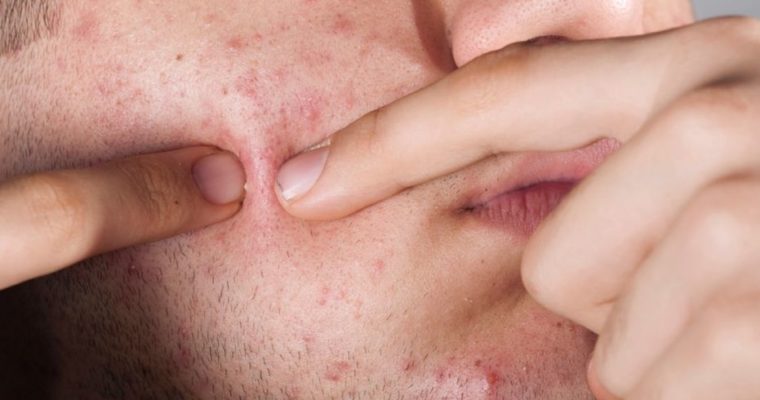Man develops fungal infection after using woodworking blade to pop pimple
Like | DoctorBabu | December 8, 2017 | Health fungal infection, pimple
A 23-year-old construction worker used a woodworking blade to remove what he called a pimple on his lower lip, developing a rare fungal infection afterward, a recent report of the man’s case revealed. The infection was likely caused by his unusual choice of tools to zap his zit, the report said.
Doctors said they suspect the woodworking blade directly transferred the spores of a fungus called Blastomyces to the man’s skin. This resulted in a large, painful, blood-encrusted lesion on the skin beneath the man’s lower lip, according to the case report, which was published Nov. 21 in the Journal of Emergency Medicine.
The Blastomyces fungi usually live in moist soil and in decomposing wood or leaves, according to the Centers for Disease Control and Prevention(CDC). In the United States, the fungus is primarily found in Midwestern, South-Central and Southeastern states, the CDC says.
eople typically become infected with Blastomyces — which causes an infection called blastomycosis — by inhaling the fungal spores, rather than through a cut on the skin. Inhaling the spores leads to a lung infection called primary pulmonary blastomycosis. (“Primary pulmonary” means that the infection started in the lungs.) One common cause of the infection is breathing in spores of the fungus while doing outdoor activities that disturb the soil. Pets, especially dogs, can also get blastomycosis.
The fungal infection usually first causes flu-like symptoms, including fever, cough and muscle aches. From the lungs, the infection can spread to other organs, the most common of which is the skin, where the fungus causes crusty lesions, according to the case report.
But in the recent case, the man did not experience any of these flu-like symptoms, because the fungal spores entered his body through his skin rather than his lungs. His only symptom, in fact, was the noticeable patch of inflamed skin just below his lower lip.
Rare fungal infection
The construction worker told doctors that his skin lesion had first appeared seven months earlier, not long after he used a woodworking blade to snip what he called a “pimple” off his lower lip.
Although the man described the blemish as a pimple, it could have been any type of skin lesion, such as a cold sore or canker sore, said lead case report author Dr. Barry Ladizinski, a dermatology resident at John H. Stroger Jr. Hospital of Cook County in Chicago who treated the man.
The infection occurred because the woodworking blade that the man used had likely come in contact with soil that contained Blastomycesspores, Ladizinski told Live Science. When the man used the blade on his lip, the tool transmitted the organisms into the cut in his skin, he said.
By the time the man came to the hospital, the entire bottom edge of his lower lip had a raised area of blood-encrusted skin with warty lesions on it and a rolled, hardened border, according to the case report.
The 23-year-old told doctors that the lesion had expanded in size since it first appeared on his face and was painful. He had no other symptoms, and his blood tests were normal, according to the case report.
The doctors performed several skin tests, which showed signs that the man had the rare fungal infection.
He was diagnosed with primary cutaneous blastomycosis, which is when an injury to the skin — in this case a cut, but it can also be an animal bite or scratch — transfers Blastomyces into the body causing an infection. (“Primary cutaneous” means that the infection started in the skin.) It’s a very rare form of the fungal infection, with fewer than 50 reported cases in the medical literature, according to the case report.
Most of the reported cases of primary cutaneous blastomycosis have been seen in dog handlers, who may pick up the infection from animal bites or scratches, and scientists, who may be accidentally exposed to the fungus while studying it, Ladizinski said. The infection tends to stay on the skin and does not spread to other organs, he noted.
The man in the case study was given an antifungal medication to treat the infection, and his skin cleared up considerably after two weeks of taking the drug, according to the report.
Originally published on Live Science.

Leave a Reply